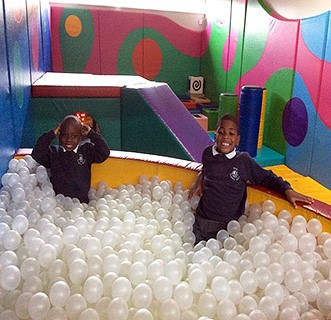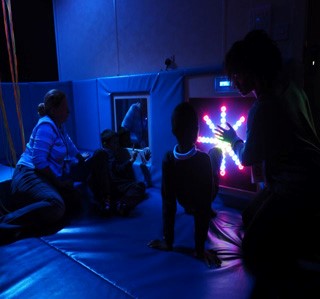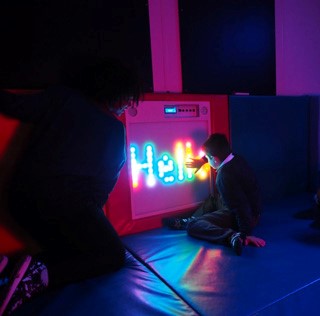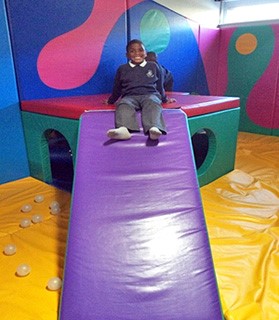
At Nelson Primary School we strongly believe that every child has the right to high quality education that can help them achieve their potential, regardless of their starting point. We are an inclusive school, we use a number of approaches to teaching that support all children and their learning styles. Children work together in a range of settings to meet their individual needs. Our SENCO is Chrissy Beddo and can be contacted via info@nelson.newham.sch.uk or on 02084720642
Developmental Language Disorder (DLD)
Nelson Primary School has a Resource Provision for children with Developmental Language Disorders (DLD). The places for this are limited and allocated by the local authority. Children in our Resourced Provision receive direct intensive speech and language therapy from an NHS therapist and follow-up programmes delivered by trained Teaching Assistants. They learn alongside peers in the classroom, receiving quality first teaching supported by strategies recommended by the speech and language therapist.
Identification
Where teachers have concerns about individual children, these are raised with the SENCo who assesses a child’s need and identifies appropriate actions through collaboration with teachers and parents/carers. In some cases, school may need advice and/or assessments from an external source. We liaise with a range of outside agencies including: Educational Psychologists; Occupational Therapists; Speech and Language Therapists; Physiotherapists, CAMHS, Child Development and specialist teachers for sensory impairments. We value their knowledge and experience and follow their recommendations in order to achieve the best outcomes for the children.
Early Intervention
We carefully track the progress of all children in our school in order to identify any barriers to learning. Individual children are discussed in Pupil Progress Meetings in order to decide on a course of action to support their needs. Intervention may take a range of forms including individual and small group support and classroom strategies. We are clear that underachievement or lack of progress and the provision of intervention are not necessarily indicators of a special educational need.
Training and Support
Throughout the year, we organise training for teachers and support staff in order to develop their own teaching and support of children with additional needs. Teaching Assistants receive ongoing training both ‘in-house’ and through external sources. They support children with visual prompts and practical resources, alongside the strategies that they have been trained to use.
SEN Information
As part of the Children and Families Act 2014, Local Authorities are required to publish a ‘Local Offer’ which sets out the support that is available for children and young people with SEND in the local area. It is also a requirement of the same act that schools publish information on their websites, updated annually, about the implementation of the setting’s policy for pupils with SEND.
Newham’s Local Offer:
https://families.newham.gov.uk/kb5/newham/directory/localoffer.page?localofferchannel=2 provides information for parents on how to access services in their area and what to expect from these services.
Nelson Primary School’s Local Offer:
Our School Offer describes the arrangements we make that are ‘additional and ‘different‘ for pupils with SEND in our school.
SEN Information Report:
SEN Information Report is updated annually and provides more detailed information on our provision for pupils with SEND.
At Nelson Primary School we believe that all children are entitled to have their needs met and to have access to high quality teaching.
How does the school know when a pupil has learning difficulties or special educational needs?
- Some children start school with a diagnosis or with specialist support
- Some children will be identified by school staff and referred for specialist support.
- Some children’s need will be identified through tracking systems, testing and observation by the class teacher or SENCO. These children may have needs which can be met through differentiated teaching, small group work and/or catch up in school.
How is the curriculum matched to pupil’s needs?
- Teachers and Teaching Assistants plan the curriculum to meet the needs of all pupils.
- Class teacher’s meet regularly with the SENCo and/or SEN teacher to plan for children with identified SEN.
- Lessons are differentiated in various ways using a range of resources, strategies and different outcomes, as appropriate.
What arrangements does the school make to support pupils with SEND transferring to our school from another school?
- All children and their parents have an admission meeting when they are provided with information about the school and can share information about their child.
- Information regarding a child’s needs is shared with class teachers and support staff prior to admission, in order to make necessary adjustments and preparation.
- If a child is likely to find the transition very difficult, a phased entry may be arranged.
- On their first day at school, children are shown around the school by our Pastoral Support Worker (PSW) and supported by a ‘buddy’ in their class.
- Our staff speak a range of community languages, which enables children and parents to access information and to support learning.
How will the school prepare and support pupils with SEND who are transferring to a new school?
- Staff may visit the new school with the child.
- All information will be transferred.
- The SENCO may be invited to observe the child in our school and invited to attend a review and planning meeting.
- School will provide transition booklets (pictorial or written) to prepare the child for transfer, if necessary.
How are parents/carers informed about their child’s needs and what support they are receiving? How are they involved in setting targets for learning?
- The class teacher or SENCO will discuss SEN Concerns with parents. External professionals may be involved and will meet parents to gather information and seek views, before assessments are made.
- Parents will be invited to meetings during the year and will be encouraged to talk to the teacher and SENCO if they have any concerns.
- Reviews and Annual reviews will be timetabled and parents and professionals will discuss children to assess progress and support.
- Parent evenings are held termly for all pupils.
- Through meetings with the teacher, SENCO and/or a relevant external professional.
- Parent workshops are also arranged to support parents understanding of different teaching approaches used by the school eg, phonics, maths, language groups etc.
What arrangements are made to support pupils with SEND taking part in after school activities outside the classroom, including school journeys?
- Children are included in trips and visits as well as residential visits. We may provide Teaching Assistant support and appropriate transport to enable this to happen. All visits are risk assessed with attention to appropriate safety measures.
- All of our children, including those with SEND, have the opportunity to attend a range of after school clubs. Teaching Assistants provide additional support for pupils when necessary.
How does the School support pupil’s overall well-being?
- We provide a range of enrichment activities including after school clubs and school visits.
- We ensure that children’s individual needs are met in the most appropriate way.
- We will do home visits, go for local walks and teach the children to keep themselves safe.
- Some children may need advocates, which we will organise.
- Children attend their annual review, where appropriate, to share their views.
- External professionals will support, where necessary, to advise children and families who have particular concerns or requirements.
Provision for Pupils with EAL
A large majority of our school community has English as an Additional language and provision for these pupils is an intrinsic part of how we teach at Nelson Primary school. Closing the vocabulary gap is an ongoing priority and explicit vocabulary teaching forms part of all lessons.
Sensory Room
We have a sensory room designed for individual and group activities for children with sensory and emotional needs.
 |
 |
Soft Play
Children with additional needs may attend offsite Soft Play sessions.
 |
 |

